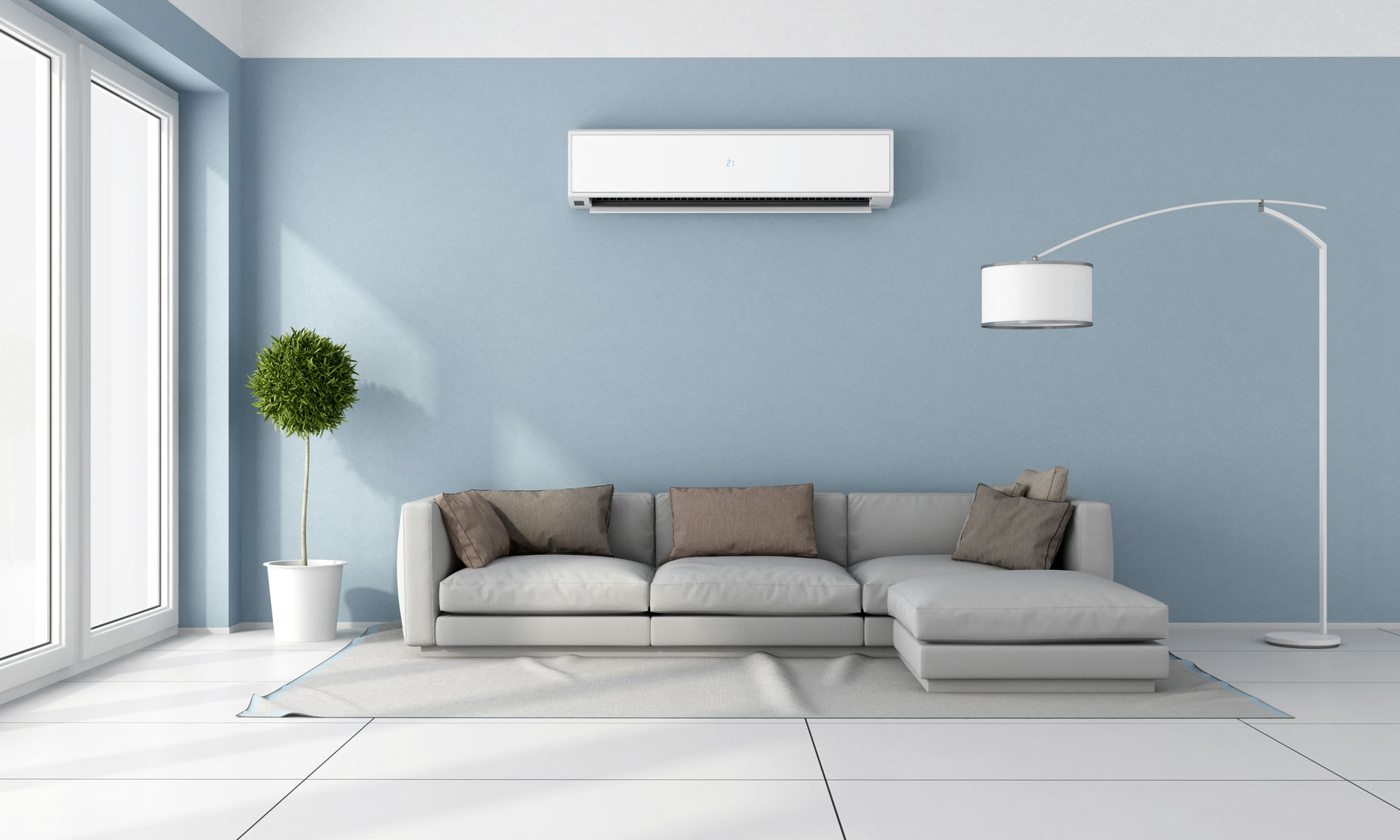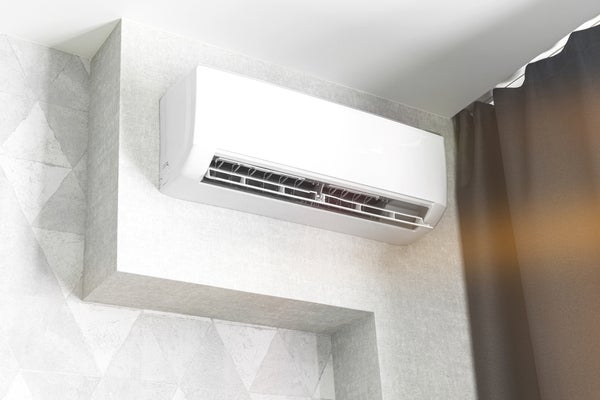Air Conditioning Options for Homes without Ductwork

If you’re looking for a new indoor air conditioner for your home, you’ll want to consider the various types of AC units, especially a ductless air conditioning system.


If you’re looking for a new indoor air conditioner for your home, you’ll want to consider the various types of AC units, especially a ductless air conditioning system.
Some older homes simply cannot accommodate the extensive ductwork required by a central heating and cooling system. Some homes may also feature "hot spots," zones or entire rooms that never seem to get quite comfortable no matter how much you fiddle with the thermostat.
Maybe you're a homeowner eager to upgrade the energy efficiency and eco-friendliness of your major home systems and appliances. Whatever the case, before you invest in a ductless heating and air conditioning unit, let’s cover the basics.
Ductless air conditioning units are standalone systems that provide air conditioning options for homes without ductwork. A ductless AC unit will typically come in one of two different configurations.
The first configuration is a ductless mini-split. This configuration cools a single room or zone. A single indoor air handler is connected to an outdoor compressor unit by electrical cables and a refrigerant line that passes through a small hole in the wall. The air handler essentially works much like it would if you were installing a window air conditioner, but you can install it anywhere on or within your wall. To maximize convection (hot air's tendency to rise and cold air's tendency to fall), air handlers are usually mounted near the ceiling. These wall-mounted heating and cooling units can run automatically or be adjusted using a dedicated remote control.
The second configuration is a ductless multi-split AC unit. Unlike a ductless mini-split, a ductless multi-split cools multiple rooms or zones. These AC units allow you to connect up to four indoor air handlers (for four rooms or zones) to one outdoor unit. Each zone has its own remote control. If one inside unit stops functioning, the other units will still work and cool their respective zones.
Ductless heating and air conditioning units are not ventless. These systems still must discharge warm air and drain condensate (excess water) created during the cooling process outside your home. Although ductless, ventless air conditioners aren’t a thing, if you’re looking for a ventless air conditioner, consider evaporative (or swamp) cooler options.
Ductless multi-splits are great for homes in which a central air conditioning system would be too expensive or impractical to install. If you currently cool your home with window units, a ductless AC unit is a definite upgrade, as the self-contained nature of the air handlers translates into fewer air leaks.
A ductless mini-split can also be a great complement to an existing central HVAC system. If you've recently added a room to your home or converted a garage into a living space, you can cool it using a mini-split instead of extending your ductwork (which can be really expensive). You can also use a ductless mini-split to improve temperature control in a single room. If one zone of your home receives a lot of sunlight, you can add a ductless mini-split to keep that room comfortable without lowering the thermostat for your entire house (and raising your electric bill).
Thinking about coverage?
Sounds like a plan. Find the warranty that fits you best.
There are several perks to ductless air conditioning. Here are just some frequent questions about ductless air conditioning systems:
They’re more flexible. You can heat or cool individual rooms or zones only when you’re occupying them, saving energy and money. Each zone has its own thermostat so that room occupants can adjust the temperature to their comfort level. Compared to a window unit, ductless mini-splits offer more placement options. You can install indoor air handlers high on your walls, hang them from your ceiling, or mount them near your floorboards. Some manufacturers even offer recessed air handlers that resemble a ducted HVAC system’s HVAC system’s conventional vents and returns.
Yes, somewhat easier to install. Installing a traditional ducted system can take a few days. Depending on how many indoor and outdoor units you need, your ductless air conditioning system can be ready to cool in as little as a few hours. The connection between the indoor and outdoor units of a ductless mini-split usually only requires a 3-inch-wide hole through your wall. Your installer doesn’t have to rebuild walls or ceilings around ductwork, so your house won’t be in a state of reconstruction for who knows how long.
Yes. With a traditional window unit AC, the compressor and the fan that cools the compressor generate a lot of noise. In a ductless mini-split, the compressor is located externally to the room being cooled.
Energy efficient. Ductless air conditioning units are not as subject to energy loss as conventional systems. Many ducted HVAC systems leak cool air as it moves from the compressor to your home's interior. In fact, according to the U.S. Department of Energy, duct losses can reduce the efficiency of air conditioning systems by up to 30 percent. That’s a lot! Thankfully, the majority of ductless air conditioning systems carry an ENERGY STAR® rating. Because ductless air conditioning systems require less electricity than most central heating and cooling air systems, you’ll also save money on your utility bills.
Yes, they are eco-friendly. Increased energy efficiency translates into a lower carbon footprint. But that’s not all. Ductless systems use a refrigerant (R410A) that has zero ozone depletion potential. So, gone are the days of feeling guilty when you turn on your AC.
Ductless air conditioners have been known to provide better indoor air quality. Air ducts in traditional HVAC systems need to be cleaned regularly. Even after cleaning, dust and other allergens may remain. Ductless air conditioning systems rely on a filtration system that can reduce the amount of dust, bacteria, pollen, and allergens in your home.

Here are some of the disadvantages of purchasing a ductless system:
Your air conditioning system is vital to your family’s seasonal comfort, whether you’re trying to stay cool in a heatwave or simply wanting to learn how air conditioners work in general to get an idea of the best solution for your household.
If you decide to purchase a ductless AC unit, protect it with an American Home Shield® home warranty, which covers mini-splits. If an unexpected breakdown of your system should occur, it can potentially cost hundreds of dollars to repair or thousands of dollars to replace. With our air conditioner warranty, if we can’t repair your covered item, we’ll replace it, subject to your plan agreement limitations and exclusions. When a covered issue happens, you don’t have to sweat it. Our warranty coverage protects your budget and your peace of mind.
Protect your home’s airflow with our extensive ductwork coverage.

AHS assumes no responsibility, and specifically disclaims all liability, for your use of any and all information contained herein.
Have a plan for your home when things don't go according to plan
Shop Home WarrantiesStaging